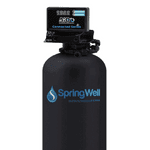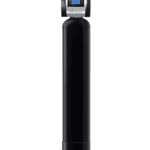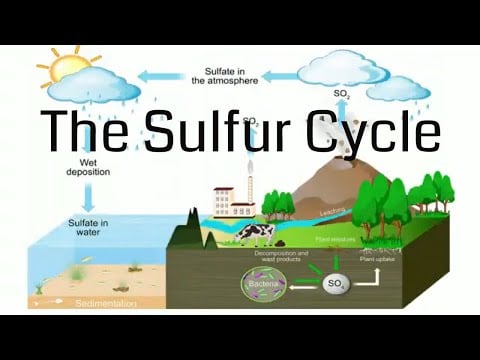Most household water filters can’t eliminate that rotten egg odor. Activated carbon units, while popular, simply aren’t up to the task. So we rolled up our sleeves and tested the latest sulfur filtration systems ourselves. After weeks of hands-on testing, a clear group of six stood out from the pack.
Expert Picks:
- Best overall: SpringWell WS
- Best Hydrogen Peroxide System: US Water Systems Matrixx
- Best Budget Option: SoftPro Iron Master
- Best Chemical Free: AFWFilters Filox 10
- Easiest to Use: iSpring WCFM500K
#1 SpringWell WS — Best Overall
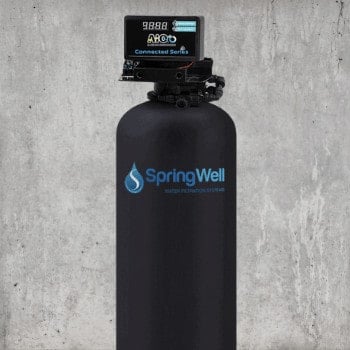
SpringWell is the one we recommend most — it’s reliable, simple to use, and works exactly like it should. After using it ourselves, we get why so many people stick with it.
Features:
- Handles up to 8 ppm of sulfur and 7 ppm of iron using air injection and Greensand — no chemicals needed
- Strong water flow (12–20 GPM) — enough for big households without pressure issues
- Bluetooth head makes it easy to program from your phone
- The filter media lasts over a decade before needing replacement
- All components are certified safe and built to last
Use Coupon Code: QWL5 to save!
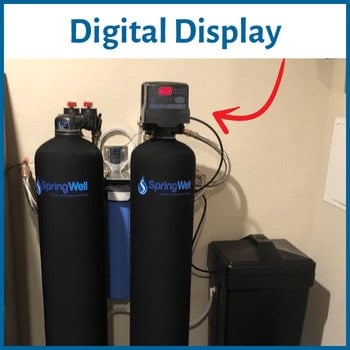
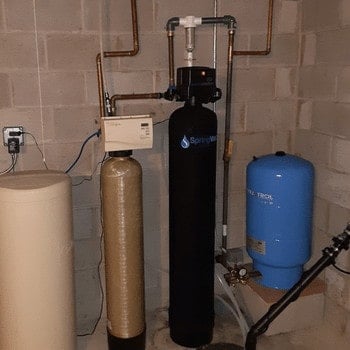
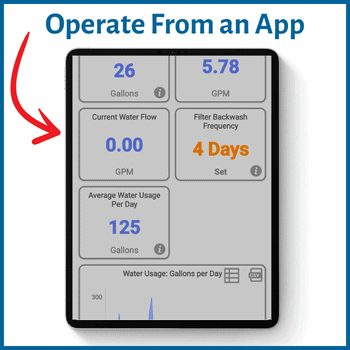
Great for: Homeowners looking for a reliable, long-term fix for both sulfur and iron — no chemicals, no headaches.
Not Ideal for: Wells with unusually high sulfur levels above 8 ppm — this system has its limits.
Pros:
- The rotten egg smell disappeared completely — water tastes clean and fresh
- Runs quietly without the banging noises older systems make
- No pressure loss, even with multiple taps running
- Bluetooth controls are easy to use and actually helpful day-to-day
- Installation was doable without a plumber — clear instructions and excellent tech support
- Plays nice with add-ons like water softeners or UV filters
Cons:
- The higher-than-average upfront price is offset by the low long-term cost of ownership — but if you’re short on cash, it’s a stretch to afford.
My Take
The SpringWell isn’t the prettiest or most powerful filter on the market. But what it lacks in swagger, it makes up for in uncompromising quality. Thoughtfully engineered, it offers all the best features without costly bells and whistles that drive up the price without making it a better filter. A winning combination, you get premium performance for less with the SpringWell.
Use Coupon Code: QWL5 to save!
Read our Full Review: Springwell WS Review
#2 MATRIXX inFusion Iron and Sulfur Removal System
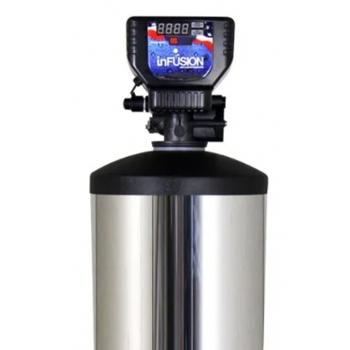
Hydrogen peroxide is known for being one of the most effective ways to treat sulfur in well water — and that’s exactly what powers the Matrixx system.
Features:
- Removes up to 30 ppm of sulfur — ideal for severe cases
- Multiple tank sizes to fit your home
- Resists channeling for more even filtration
- Performs well with low water pressure
- App-controlled with the Water Logix head
- NSF-certified parts and a 5-year warranty
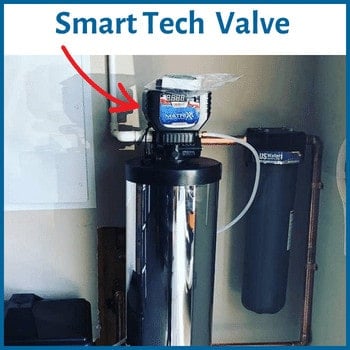
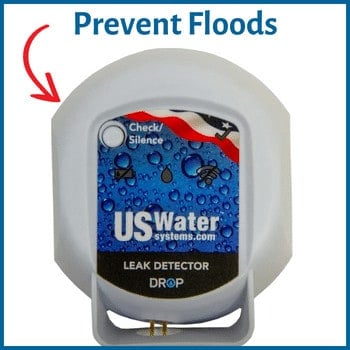
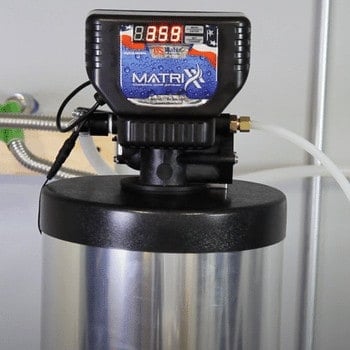
Perfect for: Homes dealing with high sulfur levels or recurring sulfur bacteria.
Not Ideal for: Buyers who want to avoid chemical injection systems.
Pros
- Tackles serious sulfur problems without breaking a sweat — up to 30 ppm is no joke
- Also targets iron and sulfur bacteria, so you’re not chasing multiple filters
- No chemical taste — just clean, fresh water that doesn’t smell like a science experiment
- Built like a tank but looks sharp — not something you’ll want to hide in the basement
- The Water Logix app is refreshingly simple — no tech skills needed
- Clear instructions make installation feel less intimidating, even for first-timers
Cons
- Takes up more space than single-tank systems
- Requires peroxide refills every few weeks — not hard, but easy to forget
- Higher long-term cost compared to non-chemical filters like the SpringWell
Our Take
Hydrogen peroxide is one of the most effective ways to get rid of rotten egg odor — and the Matrixx uses it better than any system we’ve reviewed. It’s overkill for most wells, which is why we usually recommend the SpringWell first. But if your water needs serious help, this is the heavy-duty solution worth the price.
#3 SoftPro Iron Master — Best Budget
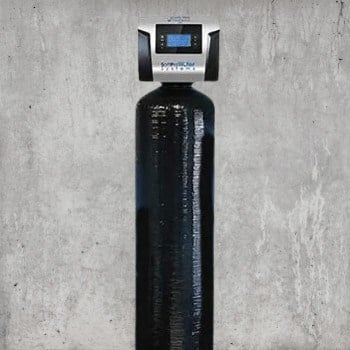
The Iron Master skips the chemicals and keeps things simple with smart design and solid media. This works well for iron and some sulfur – plus, it’s affordable.
Features:
- Removes up to 5 ppm of sulfur, plus iron and manganese
- Uses Katalox and air injection — no chemicals required
- Built to prevent channeling for more even filtration
- Battery backup keeps settings during power outages
- Multiple tank sizes available to suit different home sizes
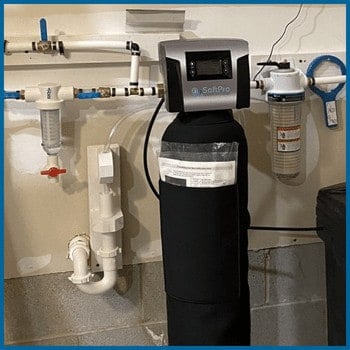
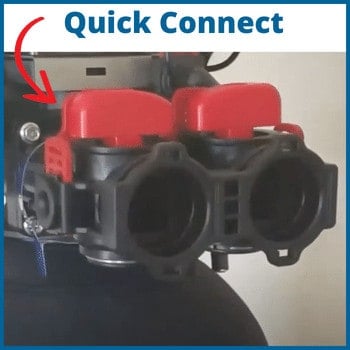
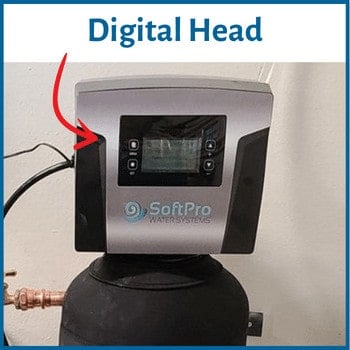
Perfect for: Homes with high iron and moderate sulfur — especially if you’re looking to keep costs down
Not Ideal for: High-tech homeowners who want remote, app-based system control.
Pros
- Reduces sulfur and iron with Katalox and air — no chemical tank or refills
- Zeosorb media filters down to 3 microns — better than basic greensand
- Backwashes use less water, which saves gallons over time
- Resists channeling for more consistent long-term performance
- Modular design — easy to service or replace parts without calling a pro
- User-friendly control head, even if you’ve never set up a system
- Great support — SoftPro helps with sizing and setup
- Delivers real performance at a lower price without cutting corners
Cons
- No app or smart home integration — everything is manual
- Slower sulfur reduction than pricier filters like the SpringWell
- Return policy includes a 25% restocking fee, which feels steep
- Doesn’t handle extreme sulfur levels — better for moderate cases
Our Take
The SoftPro Iron Master reduces less hydrogen sulfide than similar filters. But because iron and sulfur often occur together, it’s a cost-effective option for homeowners with both problems to tackle. If your water contains more sulfur than iron, consider the SpringWell. But if iron removal is the priority, the SoftPro is your filter. Let your water test decide.
Read our Full Review: Softpro Iron filter review
#4 AFWFilters Filox 10 — Iron, Sulfur, & Manganese Removal Water Filter
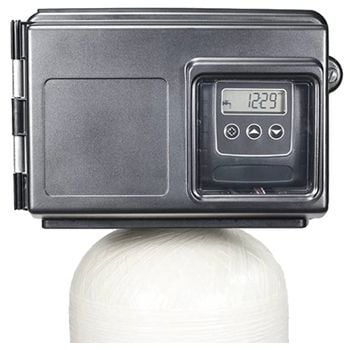
Filox filters skip the chemicals and complicated parts. This one handles sulfur and iron without much fuss — and it runs quietly in the background.
Features:
- Treats up to 7 ppm sulfur, 15 ppm iron, and 3 ppm manganese
- Uses Filox media — a dense manganese dioxide that doesn’t need chemicals
- Self-cleaning and low maintenance
- Built with the Fleck 2510SXT control valve — simple and reliable
- Ships partially pre-loaded for easier setup
- Half the price of the competition.
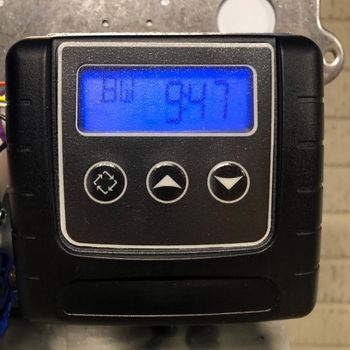

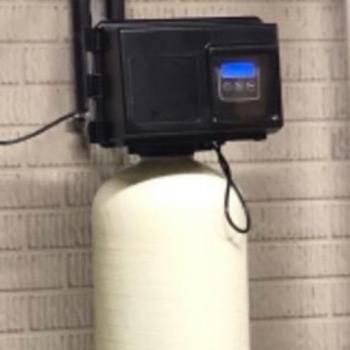
Great for: Homeowners who want a capable but quiet and chemical-free filter.
Not Ideal for: Buyers who expect complete contaminant removal.
Pros
- No chemical tanks or refill routines — it runs clean and simple
- Quiet performance makes it ideal for homes where noise is a concern
- The control head is beginner-friendly — no learning curve
- One of the easiest chemical-free systems to install and live with
- At 40% less than the SpringWell and 30% less than the Iron Master, the low price makes it a good entry-level filter.
Cons
- Media doesn’t last as long as premium options like SpringWell
- Not ideal for high sulfur concentrations
- Installation manual needs better layout — read it all before starting
Our Take
Air and chemical filtration remove more hydrogen sulfide odors than manganese dioxide alone. Still, as a homeowner, you have to balance contaminant reduction with other factors. If you want an affordable, chemical-free filter, it’s effective enough to take the sting out of most sulfur problems. A good compromise — AWF’s Filox filter leads the pack among similar models.
#5 iSpring WCFM500K — Iron, Manganese, and Hydrogen Sulfide Water Filtration System
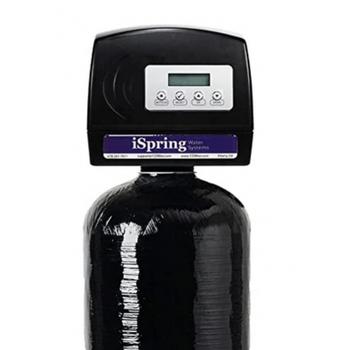
Among the most effective AIO filters for sulfur removal, the iSpring gives the SpringWell a run for its money.
Features
- Removes up to 20 ppm of sulfur, plus iron and manganese
- Combines AIO and catalytic carbon for chemical-free filtration
- Built-in 3-micron sediment filter saves you from buying another unit
- 15 GPM flow rate supports larger households
- Uses a rebranded Fleck control valve and NSF-certified components
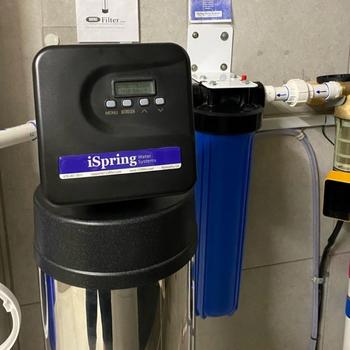
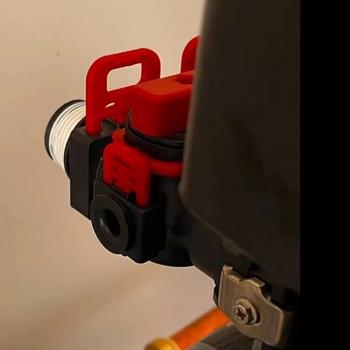
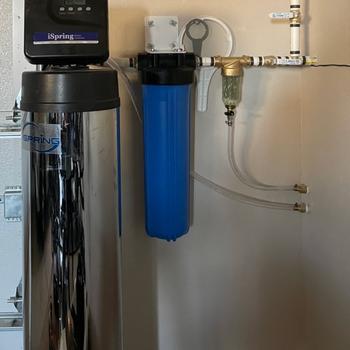
Great for: Homeowners with serious sulfur problems who want chemical-free filtration.
Not Ideal for: If warranty matters, stick with the SpringWell.
Pros
- Banishes hydrogen sulfide odor.
- Has fewer moving parts than similar filters, so there’s less to go wrong.
- Systems come preloaded and partially pre-assembled for the fastest installation ever.
- The fine sediment filtration clarified our water better than any other sulfur filter we tested — kiss dirt and rust goodbye!
- User-friendly digital head — the programming couldn’t be easier.
- This model is compatible with other iSpring filters — if you need a water softener or UV filtration system, you can add extra components without compatibility issues.
- iSpring is a well-established global company with a secure supply chain for replacement parts — you won’t be left high and dry.
Cons
- Disappointing 1-year warranty — extended warranties are available upon product registration, but they cost nearly as much as the entire system. Ouch!
- We noticed no noticeable drop in water pressure until a fourth tap was opened — that’s well above average performance, but the flow rate may feel sluggish in a large home.
- With no remote control option, it’s a top performer but a step behind technologically.
Our Take
The iSpring is an exceptional filter, but it’s less advanced than similar systems despite a higher price tag. And without a good warranty, it’s a risky purchase. So, while we weren’t disappointed in the iSpring’s performance, the SpringWell offers more for your money. Dollar for dollar, it’s a better value.
Buyer’s Guide

Buyer’s Guide to Purchasing a Whole House Water Filter for Hydrogen Sulfide Removal.
Hydrogen sulfide gas produces an unmistakable rotten egg odor. One whiff is enough to send you running from a room. Not only does it make drinking, cooking and bathing with well water unbearable, but it also has unpredictable and potentially dangerous consequences.
What’s in the Guide?
If you’ve had enough of the rotten egg smell in your well water, this guide is for you.
In it, we discuss:
- What hydrogen sulfide is
- Where it comes from
- How it affects your health and home
- Sulfur removal technologies
- Key Considerations
- Answers to your most common questions and more
Our goal is to help you understand hydrogen sulfide contamination and what to do about it.
How We Picked
Our process for selecting the best systems begins with understanding the specific needs of your home. Depending on the size and type of well, different types of filtration systems may be necessary to effectively remove sulfur from your water supply.
After determining what type of filter is needed, it’s important to research various brands and models that are available in order to find one that meets all requirements while also being cost-effective. Additionally, it is important to consider factors such as maintenance costs, installation fees, warranty coverage, and customer reviews when making a decision.
Once you have narrowed down your choices based on these criteria, you can then compare prices between vendors in order to get the best deal possible. Finally, once you have chosen a filter system that fits both your budget and needs, make sure to install it properly according to manufacturer instructions in order for it work correctly and efficiently over time.
Are Sulfur and Hydrogen Sulfide the Same Thing?
Sulfur is an element — a powdery yellow rock. Hydrogen sulfide gas is a chemical compound containing sulfur. They’re not exactly the same. But, unless you’re a chemist, the terms can be used interchangeably when discussing water filtration.
Sources of Hydrogen Sulfide in Water
Hydrogen sulfide is produced in low-oxygen environments from the soil to your water heater. Insoluble in liquid, it escapes when you open a tap.
In groundwater, it’s the result of a chemical reaction between rotting vegetation and naturally occurring sulfur minerals in rock. In your plumbing system, it’s caused by sulfate-reducing bacteria — microorganisms that feed on sulfur in the water and produce hydrogen sulfide gas as a waste product.
Because large quantities of organic matter are found in swamps, your well is at greater risk of hydrogen sulfide contamination if you live near a bog or where oil, natural gas and coal deposits are extracted.
The Impact of Hydrogen Sulfide Gas
The impact of hydrogen sulfide gas goes well beyond the rotten egg smell. At low to moderate levels, the gas alone is non-toxic.
But in high concentrations, the hydrogen sulfide gas emanating from water can collect in confined, low-lying spaces, such as well pits and basements. Too much can be both poisonous and flammable.
Dissolved in water, hydrogen sulfide is benign. But inhalation exposure causes dizziness, headaches and lung irritation. And rarely, structures have exploded due to gas build-up.
Sulfur bacteria are also common where hydrogen sulfide accumulates. Over time, it colonizes your plumbing system, producing a thick slime that clogs pipes and serves as a continuous source of rotten egg odor. Corrosive, it wreaks havoc on metal components.
Should I Test Water for Hydrogen Sulfide?
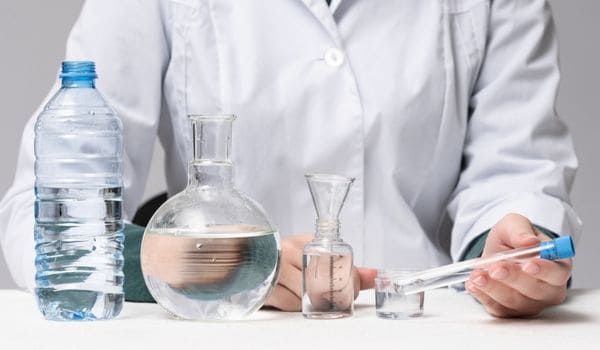
Hydrogen sulfide odor is just one sign of sulfur contamination. Others include yellow discolorations on clothing, brown slime on bathroom fixtures and black stains on silverware and pipes. But because other contaminants, inducing tannins, manganese and iron bacteria, can cause similar signs, it pays to know exactly what you’re dealing with before investing in a filtration system.
We recommend The Tap Score Essential Well Water Test. It covers the CDC’s annual testing recommendations plus:
- Iron
- Manganese
- Hydrogen sulfide
If you’ve already tested your water this year, Tap Score’s Yellow Tap Water Test identifies iron, manganese, hydrogen sulfide and iron bacteria.
The testing process is painless and gives you actionable information with which to select the best system. Spoiler: It’s common for well water to contain sulfur, iron and manganese.
See our top recommended water testing kits
Explore Your Options

If you only smell hydrogen sulfide in your hot water, then sulfur bacteria may have colonized your plumbing system. In some cases, shock chlorination can eliminate the smell for good. But in most cases, there’s an underlying issue that only a water filtration system can cure.
If you smell sulfur in both cold and hot water, a sulfur filter is your only practical option. Thankfully, there are several that reduce hydrogen sulfide.
Depending on the concentration, we recommend:
Air Oxidization Injection (AIO) Water Filters
Air oxidation (AOI) filters use oxygen to convert hydrogen sulfide gas into solid sulfur particles. An injector creates a pocket of air at the top of the media tank that oxides iron, manganese and hydrogen sulfide as water flows through it.
In a brilliantly simple system, the oxidized solids collect in a granular media tank until it’s full. Backwashing then rinses away the contaminants and rejuvenates the media bed.
Chemical Oxidization Filtration Systems
Chemical oxidation filters work on the same principle as air injection systems except that chemicals are used as oxidizers instead of oxygen. It seems risky, but there are benefits.
Chlorine injection systems are among the most common because they’re inexpensive. And they kill bacteria, so they’re a good option for controlling persistent sulfur bacteria or treating biologically unsafe wells.
Hydrogen peroxide injection systems are equally effective and growing in popularity. They remove higher concentrations of hydrogen sulfide than AIO filters with less odor than chlorine injection systems.
Catalytic Carbon Filters
Ordinary activated carbon filters remove up to 0.3 ppm of hydrogen sulfide. Negligible, it’s significantly less than the 0.5 -1 ppm threshold at which most people smell it.
But catalytic carbon filters remove higher concentrations of sulfur through a two-step adsorption and oxidation process. Several factors affect their performance, however, including contact time and the amount of dissolved oxygen in your well water.
Catalytic carbon media needs 3-5 minutes to work, so how filters are engineered is critical. And they require at least 4.0 ppm of dissolved oxygen in water to be effective. Since most residential well water contains 5 ppm or more, it’s only a rare problem.
Manganese Dioxide Water Filters
Like chlorine and hydrogen peroxide, manganese dioxide is a powerful oxidizer. When added to granular filter media, it boosts iron and sulfur reduction without air or chemicals. Self-cleaning, single-tank systems, manganese dioxide filters don’t require a solution reservoir or a noisy air injector. They’re a good choice for small spaces.
Filox, the most well-known brand of manganese dioxide media, removes up to 10 ppm of hydrogen sulfide. But it has the same limitations as catalytic carbon. Without 4 ppm of dissolved oxygen, it falls flat.
We suggest doing a dissolved oxygen test before purchasing a catalytic carbon or manganese dioxide filter for sulfur. Used for aquariums, they’re available over the counter for as little as $10.
Ion Exchange Filters
Ion exchange filters for well water differ from water softeners. Instead of the usual cation resin, the media bed contains anion resin with an affinity for sulfides.
Ion exchange filters can neutralize up to 90% of hydrogen sulfide molecules, but at a higher price and with many more limitations than oxidizing filters. We don’t typically recommend them.
Selecting a Hydrogen Sulfide Filter — Key Considerations

Not all water filters are ideal for every situation — there’s no one-size-fits-all solution. So, keep these considerations in mind as you shop.
Other Contaminants in Your Water Supply
The average well contains more than one contaminant. So, if a test reveals other hazardous substances in your water, you’ll need to balance those risks with getting rid of the hydrogen sulfide smell. The good news is that the right filter or combination of filters for well water can do both.
A whole-house catalytic carbon filter alone, for example, can reduce up to 3 ppm of hydrogen sulfide plus other common contaminants from heavy metals to industrial solvents. It doesn’t, however, remove iron.
To tame tough iron and sulfur issues, you need an air injection or chemical oxidation filter. But what if your well also contains bacteria? Unlike a carbon filter, a chlorine injection system eliminates iron and sulfur plus dangerous pathogens that can make you sick.
Sulfur Filtration Capacity
Sulfur filtration capacity is the most important consideration when buying a sulfur filter. Why spend the money if it won’t help your water smell better?
How much hydrogen sulfide sulfur filters remove, however, depends on several factors from the type of system to your water quality. Let’s review your options.
Catalytic carbon removes up to 3 ppm of hydrogen sulfide. Alone, it’s best used for reducing low levels of sulfur. More often, it’s combined with other sulfur filtration methods to boost hydrogen sulfide removal and reduce other contaminants.
Air injection filters eliminate an average of 5-10 ppm. But the technology is still relatively new, so performance varies significantly between models. The brands chosen for our reviews are among the most advanced and can reliably handle between 5 and 20 ppm.
Manganese oxide filters are best for moderate sulfur concentrations between 4-7 ppm. Chemical oxidation filters are the most effective, managing levels as high as 30 ppm.
System Types
Several water filtration systems remove hydrogen sulfide, but some may be a better fit for you than others. If you don’t like having chemicals in the house, investing in an air injection system or a manganese oxide filter makes more sense than buying a chemical-based sulfur filter.
And of the two, manganese oxide filters are the least noisy. If you have to install it near a basement bedroom, an air injector may be loud enough to keep you awake.
For high levels of hydrogen sulfide, chemical sulfur removal systems may be the best option for eliminating rotten egg smell. Still, you have choices. Chlorine is cheap, but it has an unpleasant odor. Hydrogen peroxide is odor-free, but you’ll pay an average of $250-$350 annually for the solution.
Installation & Maintenance Requirements

Most sulfur filters are straightforward to install. With basic plumbing know-how, you can do it in a day.
We gave preference to easy-to-install models with solid technical support from the manufacturer. But like any whole-house water filter system, you may want to hire a pro if your plumbing is irregular, or you’re uncomfortable cutting pipes. It increases the cost of the project, but you’re better safe than sorry.
Maintenance is equally simple. One benefit of a backwashing water filter is that there are no filter cartridges to change. But each type of system has its quirks.
With chemical oxidation systems, you need to refill the solution reservoir up to every few weeks depending on your water usage. And because chemicals are harsh, some manufacturers recommend replacing delicate parts, like rubber gaskets, on a regular schedule to avoid unexpected repairs.
The media in the filtration tank lasts five or more years. It’s time-consuming but not difficult to replace, and it’s a bargain compared to replacing the entire water filtration system.
An AIO water filter requires less maintenance. Still, the injector in the control valve takes a beating, so occasional lubrication or replacement is advised. The filtration media lasts 5 or more years and may outlast the control valve.
Catalytic carbon and manganese oxide filters rely only on granular media to remove sulfur. So, without the benefit of air or chemical oxidation, how long it lasts varies based on your water quality and usage. The media in some systems on our list lasts a lifetime.
Warranties
Price, quality and warranty don’t always correlate. But in general, the more confidence a manufacturer has in its product, the better the warranty terms they offer.
The best overall system on our list has a limited lifetime warranty on the tank and control valve. As with most water filtration systems, granular media is rarely covered because performance depends on water quality and usage.
Some manufacturers also offer extended coverage for an additional fee. So, consider your budget. If you couldn’t afford to repair or replace a filter today, the coverage may come in handy tomorrow.
What some won’t tell you, however, is that warranties are only as good as companies are reputable. Our analysis includes a thorough review of customer feedback.
 86 people found this helpful. Was this guide helpful to you?
86 people found this helpful. Was this guide helpful to you? 
